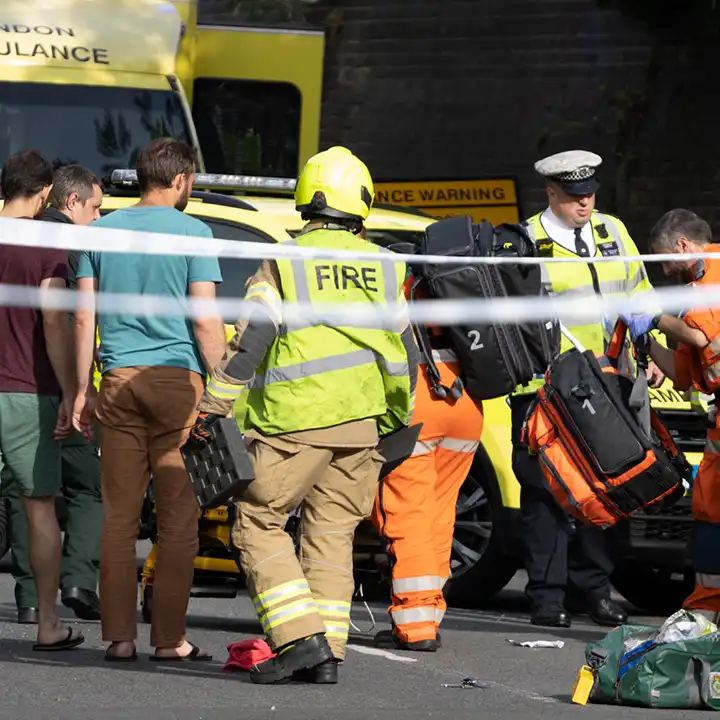Develop
A career in resilience
In today’s complex and ever-changing landscape, the role of a Resilience Professional is vital in safeguarding communities and enhancing national security. The UK Resilience Academy (UKRA) is dedicated to defining this crucial role through ongoing consultations and focus groups. As we refine our understanding of what constitutes a Resilience Professional, we invite you to consider the following key attributes and responsibilities that characterise this occupation..
What do Resilience professionals do?
Through comprehensive focus groups, the UKRA have crafted a definition of what it means to be a Resilient Professional. This is still in draft phase as the consultation continues.
- Adopt a whole-of-society approach, working across organisational and operational boundaries to build partnerships and empower stakeholders.
- Work collectively to understand the complex and dynamic systems they operate in, anticipating and mitigating risks where possible.
- Develop policy frameworks, capabilities, and coordinate arrangements so that they are prepared for disruptive events.
- Respond swiftly and effectively to protect people, addressing their needs while supporting the resilient recovery of organisations, businesses, and communities.
- Communicate clearly and confidently about risks and effective actions to protect those exposed.
- Evaluate and continuously improve practise through skills development, validation, and exercises, ensuring accountability.
Explore the journeys of those already making a difference in the resilience community through our resilience personas.

National Occupational Standards (NOS)
National Occupational Standards (NOS) define the performance criteria and knowledge required for a job role. They provide a benchmark for expectations across different organisations and sectors while allowing flexibility for local interpretation. NOS set a high-level standard for responsibilities, which can be adapted into specific and more detailed competencies to define performance in particular contexts.
The UKRA worked with the Workforce Development Trust and a cross sector expert working group to review the Civil Contingencies National Occupational Standards (NOS). After a full consultation the new Resilience and Emergencies NOS have been published.
Competencies
Competencies sit beneath the National Occupational Standards (NOS), translating broad role expectations into specific, observable, and measurable behaviours. While NOS define what a role entails, competencies describe how it should be carried out. This ensures greater consistency of practice across organisations and sectors.
Competencies are essential for training needs analysis and role-holder assessment. They support the identification of skill gaps and provide a basis for evaluating whether individuals can perform their roles effectively in both routine and high-pressure situations.
UKRA will shortly be piloting a new suite of crisis and incident management competencies and will be inviting feedback from across the sector.

Skill levels
Government skills frameworks define four ascending skill levels: Awareness, Working, Practitioner, and Expert. These levels describe the proficiency required for different roles and are captured in the wording of competencies. Not all resilience roles require the same level of proficiency in each functional area.
Awareness
- Understands core resilience concepts and their significance.
- Recognises how resilience processes contribute to wider organisational and societal objectives.
Working
- Applies core resilience concepts to routine activities.
- Works independently on routine tasks and collaborates with experienced colleagues on complex challenges.
- Understands the immediate risk context and identifies challenges when applying standard processes and procedures.
Practitioner
- Applies systems thinking to resilience challenges and adapts approaches as needed.
- Takes responsibility for developing and improving systems, processes, and procedures.
- Supports, mentors, and develops others in resilience practice.
- Engages with stakeholders and partners to enhance resilience strategies.
Expert
- Shapes resilience policy, strategy, and governance through systems thinking and innovation.
- Sets professional standards and defines best practices in resilience.
- Designs integrated resilience approaches and evaluates their effectiveness.
- Leads cross-sector collaboration to improve resilience outcomes.
- Provides high-level advice to navigate complex challenges and drive continuous improvement.
Proficiency levels broadly equate to qualification levels as indicated in the table below
Build your resilience skills
Organisational Resilience
Our courses equip professionals with the knowledge and skills to help organisations thrive in a complex risk landscape—adapting, responding, and recovering swiftly from disruptions while maintaining essential services.
Courses cover:
Business Continuity – Aligning continuity planning with regulatory and operational requirements to ensure resilience across interconnected organisational systems.
Resilient Leadership & Culture – Developing leadership approaches that foster adaptability, strengthen decision-making in complex contexts, and embed resilience as a strategic priority.
Resilience Governance – Embedding resilience oversight into governance structures, risk management processes, and organisational decision-making for long-term sustainability.
Crisis & Incident Management
Explore our Crisis and incident management courses. These courses provide insight into the principles, structures, and decision-making processes essential for managing, coordinating, and leading incident response at local and national levels. Designed for professionals in operational, tactical, and strategic command and coordination roles you will find awareness level online courses. Blended working and practitioner level courses.
Follow our events page for upcoming master classes and webinars for additional learning opportunities.
Preparedness
Explore our Preparedness Courses, designed for professionals looking to develop their understanding of:
Risk Foresight & Assessment – Identifying, assessing, and anticipating risks using horizon scanning and intelligence-led decision-making.
Capability Development – Establishing the resources, policies, plans, and procedures needed to prepare for, respond to, and manage recovery from disruptions.
Capability Evaluation & Assurance – Using exercises and other tools to test, improve, and embed resilience capabilities.
Community Resilience & Engagement – Working with communities, the voluntary sector, and organisations to raise awareness and strengthen resilience.
Managing Recovery – Collaborating with communities and stakeholders to identify recovery needs, facilitate local recovery efforts, and lead complex recovery programmes.